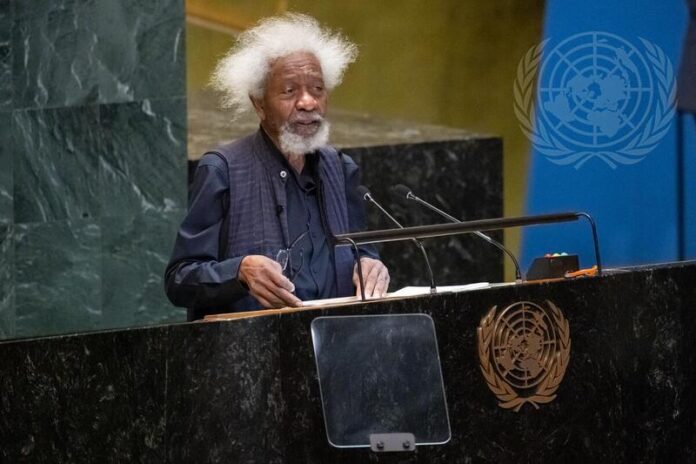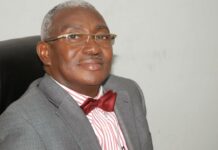Slave trade back in Africa – Soyinka
By Jeffrey Agbo
Nobel Laureate Prof Wole Soyinka has called on the world’s attention to the existence of slave trade in the modern day.
The 90-year-old said slave trade is now morphed into what he described as structure and sustaining practicalities, adding that slavers are next door and in the ascendant.
Soyinka spoke at the United Nations’ annual ceremony in observance of the International Day of Remembrance of the Victims of Slavery and the Transatlantic Slave Trade, under the theme: “Acknowledge the past. Repair the present. Build a future of dignity and justice.”
The event was held on Tuesday, March 25, 2025, at UN Headquarters in New York. A copy of his speech was made available to TheNiche on Wednesday.
“Unlike the originals who took risks, today’s slave raiders simply wait until defenceless children are gathered together in one place at the behest and/ or compulsion of governance, parents and guardians, for the purpose of learning,” the professor said.
“The hyenas swoop upon the unsuspecting prey, cart them off, sequester them in forest and other holding pens, then call on families and governments to come and negotiate for them.
“The world, including its global institutions had better wake up to the fact that the slave trade is back on African soil with a one-sided ferocity, all the more obscene and blasphemous for being camouflaged as a religious mandate. Chibok – plus its insatiable clones and enabling environment – places a searing question mark on Africa’s authentic self recovery after centuries of being mere annotations in the histories of others, to be expunged at will.”
Soyinka further said: “It is totally irrelevant that one enslaved victim ends up marrying a scion of the house of his owners or becomes a companion and paraclete of spiritual avatars, mostly converts under duress. Exceptions hold out the torch of humanistic possibilities but do not ignite the flame of universal enlightenment. That task is left to us, successors to generations of human despoilation.
“It is either one accepts that this is a viable foundation for a vision of harmonious co-existence or else a delusion. Some illusions are still with us, after centuries. They morph, change colour, texture, motion, even nomenclature. Undetected for what they really are, they become a way of dealing with history, to be protected and sustained by other social constructs. They prove quite seductive, even compel adoption by society’s greatest thinkers – from economic theorists to religious expositors. Slavery is one such permissive foraging ground for revisionists, and the African continent remains the dedicated, indeed consecrated – in more senses than one – consecrated material base for the blood transfusion that continues to sustained the aberration.
“When eventually, and for whatever reason, the warps in the conceptual template of perpetrators and beneficiaries on the one hand, and/or victims on the other, are ironed out, the ledger book of profit and loss is bought out, dusted down, and dormant claims are brought to the fore.
“To reinforce that self-evident base, the sordid business is not yet over. Extant slave markets endure in notable parts of the world, including, most ironically, within the resource centre itself – the African continent. Establishing this for Doubting Thomases is easy though – we can lead you to them, physically. Often more difficult to establish, however, is the condition itself that constitutes slavery. Yet we must address it. We must, since one is fed by, and feeds on the other, creating a vicious cycle. The agent of that condition can be an individual, a community, a class, a race, or a religion.
“When, for instance, two hundred and seventy-nine school pupils, all female, are kidnapped from within a supposed sanctuary of learning, taken into a forest, divided up among their captors and scattered to all corners of the world, we need no instruction in conceiving their fate. Captives of an undeclared war, subject to commodity negotiations, bound to the whims and caprices of successive intermediaries and owners, their fate is to succumb to sexual duties, even where underage. These are the twenty-first century horrors that spice the humdrum fare of daily existence.”
Addressing what he called neo-theocratism, Soyinka revisited the 2023 refusal of the Emir of Ilorin, Sulu Gambari, to allow traditional worshippers observe Isese festival in Ilorin, Kwara State capital.
He said, “Thus, religious conversion had come to constitute a serious trade hazard since it dried up resources. The mission of the spirit cravenly ceded supremacy to market forces. How could such cynicism fail to sear collective memory when, as in recent instance, a supernumerary local ruler in that same traumatised country of mine breaks through the cocoon of time to ban the procession of traditional African religionists through the streets of their ancestral land, cultures and world view? Such sights, he declared, were offensive to his sight and retrograde in essence. The responses, one is heartened to say, were swift, but the danger has not passed. And so, just as one speaks today of neo-colonialism, it would be wise to take note of the eruption of neo-theocratism, powered by antiquated notions of master-slave relations.”
To end slave trade, Soyinka called for the empowerment of UNESCO to complete the task it had commenced.













